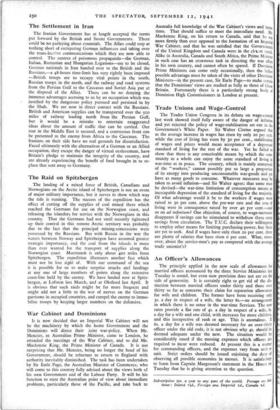War Cabinet and Dominions
It is now decided that an Imperial War Cabinet will not be the machinery by which the home Government and the Dominions will direct their joint war-policy. When Mr. Menzies, as Australian Prime Minister, came to London, he attended the meetings of the War Cabinet, and so did Mr. Mackenzie King, the Prime Minister of Canada. It is not surprising that Mr. Menzies, being no longer the head of his Government, should be reluctant to return to England with authority inevitably diminished. The task has been undertaken by Sir Earle Page, the Australian Minister of Commerce, who will come to this country fully advised about the views both of his own Government and of the Labour Party. It will be his function to state the Australian point of view about immediate problems, particularly those of the Pacific, and take back to Australia full knowledge of the War. Cabinet's views and inten. tions. That should suffice to meet the immediate need. Mackenzie King, on his return to Canada, said that he was more firmly than ever opposed to the formation of an Imperial War Cabinet, and that he was satisfied that the Governments of the United Kingdom and Canada were in the cliN 2st touch, Alike in Australia, Canada and South Africa, the Prime Minister in each case has an enormous task in directing the war effort in his own country, and cannot often be spared. If Dominion Prime Ministers can come only occasionally, then the fullest possible advantage must be taken of the visits of other Dominion Ministers—in the present case, Sir Earle Page—to make certain that the Dominions' views are studied as fully as those of Great Britain. Fortunately there is a particularly strong body of Dominion High Commissioners in London at present.


























 Previous page
Previous page